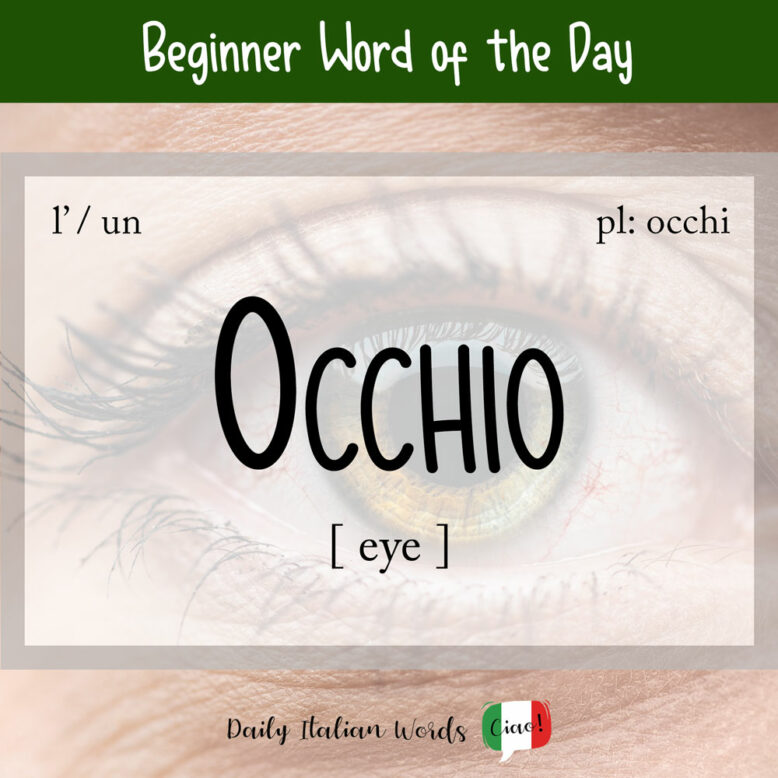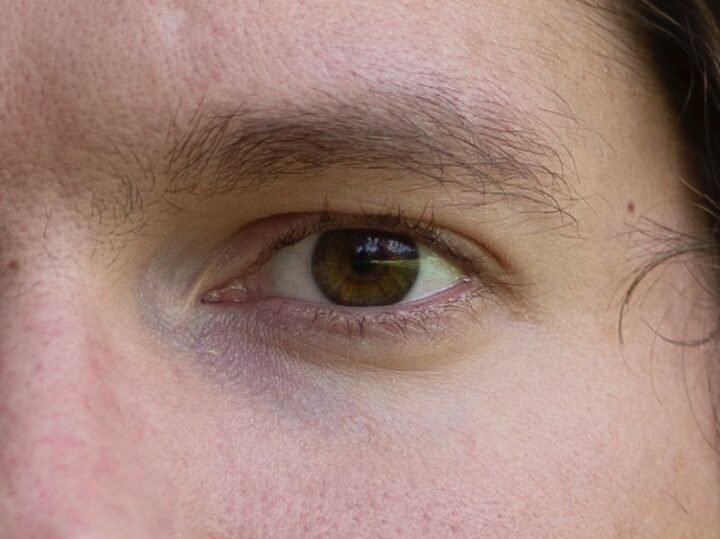The word for eye in Italian is occhio (masculine, plural: occhi).

Just as in English, it refers to the physical body part but also has a number of figurative meanings related to sight.
Mi è entrato qualcosa nell’occhio!
Something went into my eye!
Below is a brief selection of the many figurative expressions containing the word occhio in the Italian language, some of which have similar equivalents in English. Because it is impossible to cover them all, we suggest checking out the very complete list in the Corriere’s online dictionary if you want to know more.
- tenere d’occhio / tenere sott’occhio = to keep an eye on
- dare un occhio a = to supervise, look after
- chiudere un occhio = to turn a blind eye
- a perdita d’occhio = as far as the eye can see
- avere sott’occhio = to be in view
- a quattr’occhi = a private conversation between two people
- a occhi chiusi = with full confidence
- a colpo d’occhio = at first glance
- a vista d’occhio = right before one’s very eyes
Trivia: Quattrocchi is a playful name for someone who wears prescription glasses. It is composed of the words quattro (four) and occhi (eyes).

Eye colour / Colore degli occhi
blue eyes
brown eyes
green eyes
black eyes
An expression you’ll often hear Italians use when they roughly measure or calculate something is a occhio (by eye). It implies that the speaker is making an approximate estimate, usually based on instinct or experience. A closely related expression to this is a occhio e croce (by eye and cross).
Quanto zucchero devo mettere? – Non lo so, vado sempre a occhio…
How much sugar do I need to put in? – I don’t know, I always make a guess…
Also related to measurements is the phrase avere buon occhio (to have a good eye), which is used to describe someone who is good at calculating or evaluating things, people and situations.
The way you’d say to wink in Italian is fare l’occhiolino or strizzare l’occhio whereas to blink translates as battere gli occhi.
The word Occhio! on its own also functions as an exclamation meaning Watch out! or Be careful!
Idioms using the word ‘occhio’
As we mentioned above, there are literally dozens of idioms containing this word, so this section only contains the ones I’ve found the most useful and interesting in day-to-day conversation. I hope you enjoy them!
Essere un pugno in un occhio
Literal translation: to be a punch in the eye
English meaning: to be an eyesore
Essere nell’occhio del ciclone
Literal translation: to be in the eye of the storm
English meaning: to be in the eye of the storm
Essere come un bruscolo in un occhio
Literal translation: to be like a speck in an eye
English meaning: to be annoying
Essere tutt’occhi
Literal translation: to be all eyes
English meaning: to be very concentrated on something
Anche l’occhio vuole la sua parte
Literal translation: even the eye wants its part
English meaning: wanting something to be aesthetically pleasing as well as useful
Non aver più occhi per piangere
Literal translation: to no longer have eyes for crying
English meaning: to experience much sorrow or misfortune
Costa un occhio della testa
Literal translation: it costs an eye from your head
English meaning: it costs a lot of money
Heather Broster is a graduate with honours in linguistics from the University of Western Ontario. She is an aspiring polyglot, proficient in English and Italian, as well as Japanese, Welsh, and French to varying degrees of fluency. Originally from Toronto, Heather has resided in various countries, notably Italy for a period of six years. Her primary focus lies in the fields of language acquisition, education, and bilingual instruction.


